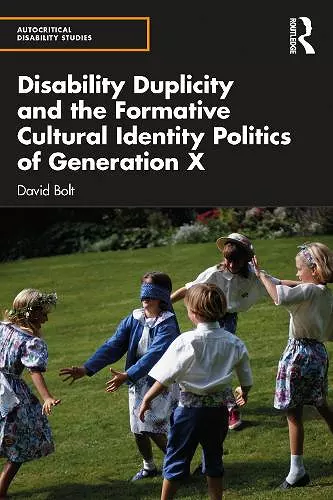Disability Duplicity and the Formative Cultural Identity Politics of Generation X
Format:Paperback
Publisher:Taylor & Francis Ltd
Published:21st Sep '23
Currently unavailable, and unfortunately no date known when it will be back
This paperback is available in another edition too:
- Hardback£145.00(9781032553986)

Disability is history and futurity, culture and society, practice and theory, work and play, an immense desire for life by which body and mind are dragged kicking and screaming into each and every new day.
Using autocritical discourse analysis, a new hybrid research method that combines aspects of the established methods of critical discourse analysis (CDA) and autoethnography, this book explores the formative cultural identity politics of disability via cultural stations of UK popular culture. These cultural stations include action figures, children’s books, television miniseries, comics, comedy films, teenage drama and sitcoms, the punk rock movement, and alternative comedy. Although the cultural stations range from toys and comics to aggressive music and chaotic sitcoms, all are considered with a focus on the language and tropes of disability. Indeed, most of the works are not remembered as portrayals of disability but the book’s analysis reveals flash if not fleeting representations that, when centralised, clarify patterns of duplicity. Via the language of power, and the power of language, all these texts are found to have contributed to the formative cultural identity politics of disability.
It will be of interest to all scholars and students of disability studies, sociology, toy studies, comic studies, humour studies, television studies, popular music studies, gender studies, literary studies, and cultural studies.
David Bolt’s Disability Duplicity and the Formative Cultural Identity Politics of Generation X is the latest of four monographs in Routledge’s Autocritical Disability Studies series. Internationally recognized as a foundational scholar within the field of critical disability studies, Bolt has done much to welcome newcomers into what he has helped become a truly interdisciplinary domain. He is both the author of this beautifully crafted monograph and the editor of this pioneering series that “represents both a contribution to, and a departure from, the academic field of critical disability studies” (ii) by addressing unease that the latter has inadequately considered the lived experiences and political concerns of disabled people. The titles within this collection blend critical disability theory, which commonly emphasizes textual analysis, with autoethnography—a coupling of autobiography and ethnography—where researchers investigate culture and society through their personal experiences and reflections. This enlightening text demonstrates that there are still so many ways to grow cultural and literary disability studies. David Bolt continues to take us in promising directions.
Chloë Hughes
Western Oregon University
ISBN: 9781032553979
Dimensions: unknown
Weight: 453g
100 pages